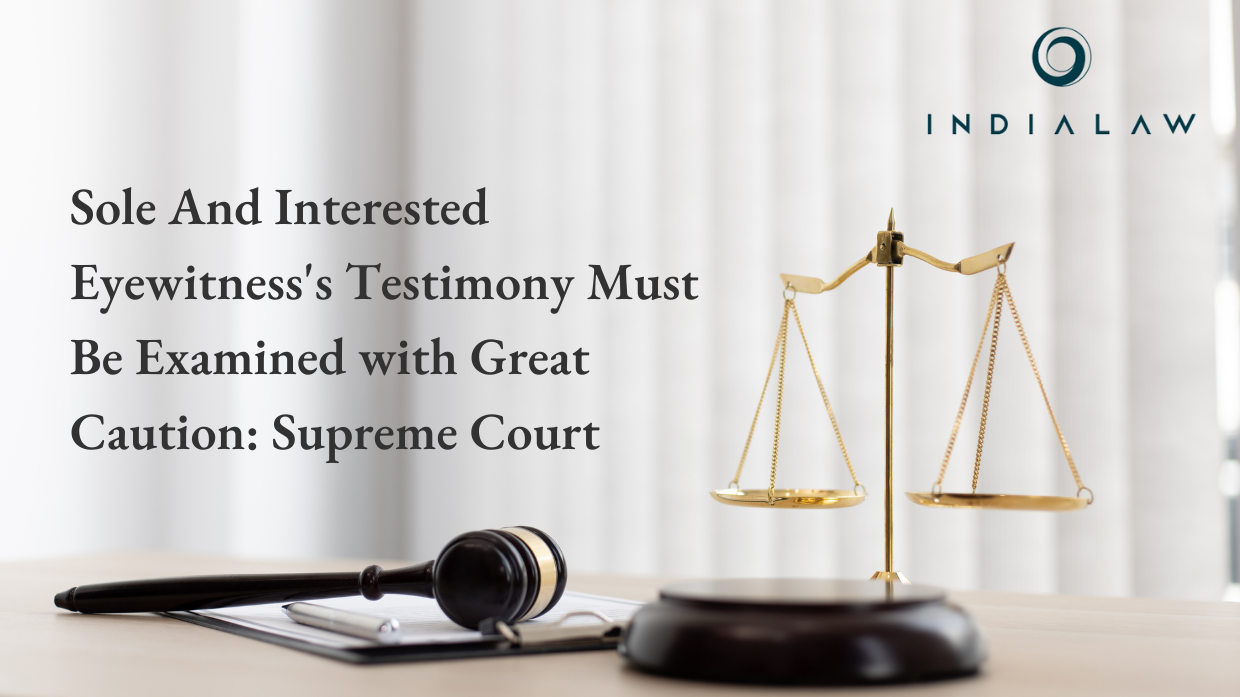Sole And Interested Eyewitness’s Testimony Must Be Examined with Great Caution: Supreme Court

The Hon’ble Supreme Court (“SC”) in the case of Chhote Lal v. Roshtash[1] stated that the testimony of sole eyewitness must be examined with great caution, especially when he was an interested witness as he was the father of the deceased and had very long enmity with the accused.
The appeal was heard by the division bench of Justice Abhay S. Oka and Justice Pankaj Mithal who affirmed the order of the High Court (“HC”) that has set aside the conviction of the accused persons.
Facts of the case
In the case at hand, since 1986 two rival groups had serious enmity. The dispute was regarding access to a public road that was blocked by one of the rival groups. The said dispute was compromised but their enmity continued to persist which resulted in the murder of Ram Kishan. In retaliation for the dispute and revenge, another rival group killed Kishan Sarup. In connection with this, an FIR was registered by Chhote Lal (the appellant).
The Sessions Court had convicted six accused out of ten people. The accused persons were convicted for committing the offenses under Sections 148, 201/149, and 302/149 of the Indian Penal Code (IPC). An appeal was filed against the impugned order and the HC has set aside the order of the Sessions Court.
Aggrieved by the acquittal of all the six accused, the appellant moved to the SC challenging the order of the HC.
Contention of the Appellant
The sole contention of the appellant was that when the accused persons were convicted and sentenced by the Sessions Court, the HC (Appellate court) was erroneous to set aside the conviction especially when there is testimony of the eyewitness against all six accused.
Issue before the SC
Whether the testimony of sole witness sufficient to convict the accused persons under Sections 148, 201/149, and 302/149 of the Indian Penal Code (IPC).
Observations of the SC
- On a detailed scrutiny of the facts, the SC observed that the appellant was the sole eyewitness in this case, however, he had not seen anyone killing his son Kishan Sarup.
- The complainant was not an eyewitness of the killing of his son but to the incident that occurred on 04.11.2000 wherein a car had chased their motorcycle, pushed them on the road, and caused the assault on the deceased and dragged him to the car.
- The complainant had not deposed anything about his intervention to save his son from assault or an attempt to stop the accused from taking his son to their car. It was noted that the appellant had not been injured during the incident.
Based on the above observations of the SC, it stressed that “The statement that he could not do so on account of the threats extended by the accused persons appears to be a bald statement as no one in a situation where his son is being assaulted and carried away would remain a mere spectator.”
The division bench further observed that the appellant had stated in the FIR that his son was assaulted with a knife and iron rod by the accused persons. However, he did not mention the use of a pistol by the accused, the police have recovered an empty cartridge.
In the postmortem report, the cause of death was firing from close range. The SC opined that based on the other evidence on record, the very presence of the appellant even during 04.11.2000 was questionable.
Conclusion of the SC
The appellant was the sole eyewitness of the incident, also he was the interested witness as he was the father of the victim, and two groups had an old rivalry. Hence, the appellant’s testimony needed to be examined with due caution. The HC was correct in doubting as to uphold the conviction of six accused merely on the testimony of the sole interested eyewitness.
The SC stressed that the conviction must be based on evidence that proves the guilt of the accused person beyond reasonable doubt. On a thorough analysis of facts, circumstances, evidence, and sole testimony, the SC upheld the order of the HC. It concluded that the prosecution had failed to prove the guilt of the accused both by circumstantial evidence and evidence of the eyewitness.
The Court clarified that “It may not be out of context to mention that the appellant/complainant, a sole eyewitness, happens to be the most interested witness being the father of the deceased and having long enmity with the group to which the accused persons belong, therefore, his testimony was to be examined with great caution and the High Court was justified in doing so and in doubting it to uphold the conviction on his solitary evidence.”
In the author’s opinion, the SC’s decision brings more clarity to the law about conviction based on sole eyewitness testimony. The Court has clarified that a sole eyewitness’s testimony can lead to conviction but the same should be of sterling quality and must be examined with great caution.
When there are discrepancies in the testimony of the sole witness then it is unlawful to confirm conviction. Hence, in the case at hand, the SC upheld the decision of the HC that had extended the benefit of the doubt to the accused persons.
[1] Diary No. 19514 – 2011, 2023 LiveLaw (SC) 1069
By entering the email address you agree to our Privacy Policy.



